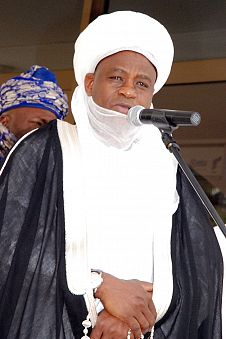Amirul Mu’minin Sheikh As-Sultan Muhammadu Sa’adu Abubakar III is the 20th Sultan of Sokoto. As Sultan of Sokoto, he is the head of the Supreme Council for Islamic Affairs in Nigeria (SCIAN), which is the umbrella body for all Muslim organisations in the country, and is considered the spiritual leader of Nigeria’s 108 million Muslims, who account for roughly 50% of the nation’s population. Although the position of Sultan of Sokoto has become largely ceremonial, the holder is still a central figure for Nigerian Muslims.
Birth: 24 August 1956 (Age: 69)
Source of Influence: Administration of Religious Affairs, Philanthropy, Charity & Development, Lineage: Lineage
Influence: Central figure for 108 million Nigerian Muslims
School of Thought: Sunni, Traditional Sunni, Maliki, Qadiriyyah Sufi Order
Status: Featured in current year
Amirul Mu’minin Sheikh As-Sultan Muhammadu Sa’adu Abubakar III is the 20th Sultan of Sokoto. As Sultan of Sokoto, he is the head of the Supreme Council for Islamic Affairs in Nigeria (SCIAN), which is the umbrella body for all Muslim organisations in the country, and is considered the spiritual leader of Nigeria’s 108 million Muslims, who account for roughly 50% of the nation’s population. Although the position of Sultan of Sokoto has become largely ceremonial, the holder is still a central figure for Nigerian Muslims.
Military Man: Sa’adu Abubakar is the son of Sultan Siddiq Abubakar III, who reigned for five decades (1938–1988). Before ascending the throne, Abubakar had a distinguished military career. He trained at the Nigerian Defence Academy in Kaduna and later served as a Brigadier General in the Nigerian Army. Before becoming Sultan, he was Nigeria’s Defence Attaché to Pakistan. He assumed the Sultanate in November 2006 following the death of his elder brother, Sultan Muhammadu Maccido, in an aeroplane crash.
Lineage Back to Sheikh Usman Dan Fodio: Abubakar is the 20th heir to the two-century-old throne founded by his ancestor, Sheikh Usman Dan Fodio. Dan Fodio (1754-1817 CE) was a scholar, leader of the Maliki school of Islam and the Qadiri branch of Sufism, and Islamic reformer of the 19th century. Dan Fodio believed that Islam should have a more central role in the life of the people of West Africa and led an uprising to institute the changes he sought. His figure and his writings are a very important chapter in the history of Islam in West Africa, and Abubakar, by lineage, holds a key place in West-African Islam, and particularly for the Fulani and Hausa people who followed Dan Fodio.
Soft Power: Sultan Abubakar III remains one of the most influential religious figures in Africa. His ability to blend traditional authority with modern engagement—spanning education, humanitarian relief, counterterrorism, interfaith dialogue, and global justice issues such as Palestine—makes him a pivotal figure in Nigeria’s quest for unity and stability. His moral and spiritual authority ensures that his voice continues to carry immense weight in Nigeria’s national and international discourse.
Countering Extremism and Promoting Peace
The Sultan has been a leading voice against violent extremism, particularly Boko Haram. He has consistently condemned the group’s actions as un-Islamic and has urged Nigerian Muslims to reject radical ideologies. His leadership has been pivotal in mobilising traditional rulers, clerics, and community leaders in efforts to de-radicalise youth and counter extremist narratives. Equally, Abubakar is a global advocate for interfaith dialogue. He has built bridges with Christian leaders to address Nigeria’s recurring religious and ethnic tensions, especially in the Middle Belt region. He co-moderates the Council of Religions for Peace (CRP), one of the world’s largest interfaith organisations, and regularly engages in joint Muslim-Christian initiatives to promote harmony. His role in calming tensions during outbreaks of sectarian violence has been widely acknowledged.
The Gaza Genocide: Sultan Abubakar III has been vocal about the plight of Palestinians. He has condemned Israeli military actions as violations of international law and human rights, urging the global community to take stronger action to end what he described as systematic oppression and collective punishment.
“Jihad simply means striving — striving to be a better Muslim, a better Christian, a better citizen, and a better human being. It is not about killing anyone. Islam abhors extremism…”
20th Sultan of Sokoto
108 million Nigerian Muslims
News about Sheikh As-Sultan Muhammadu Sa’adu Abubakar III
- No approved news items yet.



